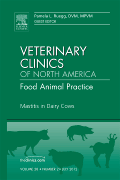
VETERINARY CLINICS OF NORTH AMERICA-FOOD ANIMAL PRACTICE
Scope & Guideline
Bridging Research and Practice in Veterinary Food Animal Health
Introduction
Aims and Scopes
- Transboundary Animal Diseases:
This area includes the study and management of diseases that cross international borders, impacting global animal health and food security. The journal emphasizes the importance of understanding and controlling diseases like Foot-and-Mouth Disease and Rift Valley Fever. - Reproductive Health and Management:
Focusing on reproductive performance in beef and dairy herds, the journal covers topics such as breeding soundness examinations, artificial insemination, and the impact of nutrition on reproductive success. - Nutritional Management:
The journal addresses the nutritional needs of various food animals, including trace mineral nutrition and metabolic diseases, highlighting the critical role of diet in maintaining animal health and productivity. - Diagnostic Approaches and Pathogen Management:
Emphasizing innovative diagnostic methods, the journal explores both classical and emerging diagnostic techniques for infectious diseases, with a focus on improving disease management and treatment outcomes. - Animal Welfare and Management Practices:
The journal discusses welfare considerations and management systems that support the health and productivity of food animals, reflecting a growing interest in ethical animal husbandry practices.
Trending and Emerging
- Emerging Infectious Diseases:
There is a growing emphasis on monitoring and managing emerging infectious diseases, such as Lumpy Skin Disease and Contagious Bovine Pleuropneumonia, highlighting the need for vigilance in disease control and prevention. - Genomics in Animal Health:
Increasing attention to genetic factors influencing animal health and productivity, particularly in relation to dairy bull fertility and breeding soundness, signifies a trend towards integrating genomic technologies in veterinary practices. - Systems Thinking in Veterinary Practice:
A notable trend is the application of systems thinking to understand complex interactions within livestock health and management, indicating a shift towards holistic approaches that consider the interconnectedness of various factors affecting animal well-being. - Management of Metabolic Diseases:
An emerging focus on the management of metabolic diseases in ruminants, particularly during transition periods, reflects an increasing recognition of the importance of nutrition and management practices in preventing these conditions.
Declining or Waning
- Honey Bee Health:
While honey bee health was previously emphasized, there has been a noticeable reduction in articles focusing on apiculture and bee diseases, suggesting a waning interest in this niche area compared to more pressing concerns in food animal health. - Non-Infectious Conditions in Ruminants:
The focus on non-infectious conditions, such as metabolic disorders, has diminished as the journal appears to concentrate more on infectious diseases and their management, reflecting a trend towards addressing immediate health threats. - Historical Disease Perspectives:
The exploration of historical disease cases and their implications for modern practice has decreased, possibly due to a shift towards more contemporary and urgent issues in veterinary medicine.
Similar Journals
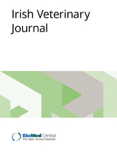
IRISH VETERINARY JOURNAL
Leading the way in veterinary discoveries and insights.IRISH VETERINARY JOURNAL is a premier open-access publication in the field of veterinary science, established to disseminate high-quality research and innovations that advance the veterinary profession and animal health. Published by BMC since 2004, this journal not only ensures worldwide access to cutting-edge findings but also maintains an impressive ranking as Q1 in the Veterinary (miscellaneous) category according to the 2023 metrics, highlighting its significance and influence. With an impressive Scopus rank of #19/194 and a 90th percentile placement, it provides a robust platform for researchers, professionals, and students alike to engage with the latest studies, reviews, and case reports. The journal's coverage spans from its inception in 1973 to the present, catering to a diverse audience interested in various aspects of veterinary science, ensuring that it remains an essential resource for those passionate about the welfare of animals and the advancement of veterinary practices.
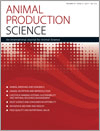
Animal Production Science
Elevating Standards in Animal Science ResearchAnimal Production Science, published by CSIRO PUBLISHING, is a prestigious journal that caters to the fields of Animal Science and Food Science. With an ISSN of 1836-0939 and an E-ISSN of 1836-5787, the journal features high-quality research and reviews that are crucial for advancing the understanding and innovation of animal production systems. Recognized within the Q2 category of both Animal Science and Zoology, and Food Science, as per the 2023 Journal Rankings, Animal Production Science has achieved commendable Scopus rankings, placing it in the 68th and 48th percentiles in its respective categories. With converged years from 2009 to 2024, and an aim to disseminate knowledge that promotes sustainable practices, the journal is pivotal for researchers, professionals, and students devoted to animal production and food security. Exploring topics from livestock management to food quality, the journal offers valuable insights for enhancing productivity while considering welfare and environmental impact. For those seeking accessibility, the journal provides various open access options, encouraging a wider reach of its scholarly articles.
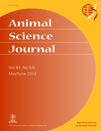
ANIMAL SCIENCE JOURNAL
Uncovering Insights for a Sustainable Future in Animal SciencesAnimal Science Journal, published by Wiley, stands as a premier platform for advancing knowledge in the fields of Agricultural and Biological Sciences, Animal Science and Zoology, and Food Science. With an ISSN of 1344-3941 and an E-ISSN of 1740-0929, this journal not only enjoys a commendable Q2 ranking across multiple categories, reflecting its significance and impact within the academic community, but it also ranks within the top percentiles in terms of Scopus rankings. Operating out of the United Kingdom, the journal covers a broad spectrum of research topics relevant to animal science, encompassing both theoretical insights and practical applications. While it is not an open access journal, it remains an essential resource for researchers and practitioners eager to enhance their understanding of animal sciences, contribute to ongoing debates, and stay abreast of the latest findings from 2003 through 2024. Scholar engagement and innovative research are central to the journal’s objectives, making it an invaluable asset for students, professionals, and academics alike.

REVISTA CIENTIFICA-FACULTAD DE CIENCIAS VETERINARIAS
Connecting scholars to elevate veterinary and agricultural knowledge.REVISTA CIENTIFICA-FACULTAD DE CIENCIAS VETERINARIAS, published by the Universidad del Zulia, is a prominent open-access journal dedicated to advancing the fields of veterinary science, animal science, and food science. Since its inception in 1997, the journal has served as a vital platform for disseminating quality research and fostering academic dialogue among professionals and scholars in the veterinary and agricultural sectors. With its commitment to open access since 2010, the journal aims to make valuable research freely accessible to a global audience, thereby contributing to the advancement of scientific knowledge. Although currently categorized in the bottom quartile of various fields—including Animal Science and Zoology, Food Science, and Immunology—REVISTA CIENTIFICA-FACULTAD DE CIENCIAS VETERINARIAS is dedicated to nurturing innovative research that addresses pressing challenges in veterinary and related sciences. Researchers, professionals, and students will find this journal to be an important resource for quality studies that have implications for animal health, food safety, and biotechnology in the context of Venezuelan and international landscapes.

Revista MVZ Cordoba
Exploring the frontiers of Veterinary Medicine from Colombia.Revista MVZ Cordoba, an esteemed publication of UNIV CORDOBA, is a pivotal resource for researchers and practitioners in the fields of Animal Science, Zoology, and Veterinary Medicine. Established as an Open Access journal since 2000, it facilitates widespread accessibility of scholarly articles from Colombia, fostering global collaboration and knowledge dissemination. The journal has demonstrated its commitment to quality, holding Q4 quartile rankings in 2023 across various categories including Animal Science and Zoology, and Aquatic Science. Despite its current challenges in rankings, with percentiles in the lower brackets, it represents an important platform for the advancements in these disciplines, specifically catering to emerging research and insights. The journal's annual publication cycle from 2008 to 2024 ensures that it remains timely and relevant in covering contemporary issues within veterinary science and related areas. For researchers, professionals, and students, Revista MVZ Cordoba stands out as a valuable avenue for the exploration of veterinary sciences within a diverse academic landscape.

Large Animal Review
Fostering interdisciplinary insights in large animal care.Large Animal Review is a prestigious academic journal dedicated to advancing the field of veterinary science, particularly focusing on the health and management of large animals. Published by the SIVAR-SOC ITALIANA VETERINARI ANIMALI REDDITO, this journal is an invaluable resource for researchers, practitioners, and students eager to explore innovative methodologies, research findings, and case studies related to veterinary medicine for larger species. With a commitment to quality, Large Animal Review holds a Q3 categorization in the Veterinary (miscellaneous) sector according to the 2023 metrics, indicative of its growing influence within the academic community. The journal benefits from an international readership and is dedicated to fostering interdisciplinary collaborations, making it an essential addition to any professional's library. The journal is accessible through various platforms, ensuring wide distribution of its valuable content, as it strives to enhance the understanding and welfare of large animals across diverse settings.
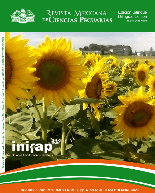
Revista Mexicana de Ciencias Pecuarias
Empowering Knowledge in Animal Health and ProductionRevista Mexicana de Ciencias Pecuarias, published by INIFAP-CENID PARASITOLOGIA VETERINARIA, is a prominent open-access journal since 2010 that caters to the fields of Animal Science and Veterinary Medicine. Based in Mexico, this journal addresses critical issues in animal health, production, and welfare, making it instrumental for researchers, professionals, and students seeking to advance their knowledge and practices. With an impact factor that reflects its growing influence, particularly in the Q3 quartile rankings in both Animal Science and Zoology as well as Veterinary (Miscellaneous) categories, the journal provides a vital platform for the dissemination of innovative research and findings. Additionally, its Scopus Ranks position highlights its role in publishing significant contributions to the fields of Veterinary Science and Agricultural Biology. The journal fosters a collaborative learning environment through its open-access model, ensuring that valuable insights are accessible to a wide audience. For those committed to enhancing animal well-being and advancing veterinary practices, the Revista Mexicana de Ciencias Pecuarias stands as a key resource through its rigorous peer-reviewed publication process and commitment to scientific excellence.
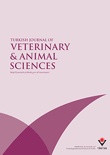
TURKISH JOURNAL OF VETERINARY & ANIMAL SCIENCES
Championing Open Access for Global Veterinary Insights.TURKISH JOURNAL OF VETERINARY & ANIMAL SCIENCES is a distinguished peer-reviewed journal dedicated to advancing knowledge in the field of veterinary sciences and animal health. Published by the Tubitak Scientific & Technological Research Council Turkey, this journal provides a platform for high-quality research, fostering scientific inquiry that spans various aspects of veterinary medicine, animal biology, and animal husbandry. With an impact factor that reflects its growing influence within the Q3 category of Veterinary (miscellaneous) according to the 2023 rankings, it is strategically positioned in the academic landscape, ranked #112 out of 194 in the broader veterinary field. The journal is committed to open access publications, ensuring that research is accessible to a global audience, facilitating collaboration and knowledge sharing among researchers, professionals, and students. By covering a broad spectrum of topics from clinical research to veterinary policy, the TURKISH JOURNAL OF VETERINARY & ANIMAL SCIENCES plays a crucial role in enhancing the understanding and welfare of animal species, thereby contributing significantly to both scientific advancement and practical applications in veterinary practice.

Frontiers in Veterinary Science
Exploring the frontiers of veterinary knowledge.Frontiers in Veterinary Science is a premier open-access journal dedicated to the latest advancements and research in the field of veterinary science. Published by FRONTIERS MEDIA SA in Switzerland, the journal has been at the forefront of disseminating high-quality research since its establishment in 2014. With an impressive rank of #15 out of 194 in the general veterinary category and a high percentile of 92nd in Scopus rankings, it is recognized as a leading publication in veterinary medicine and related disciplines, maintaining a prominent Q1 quartile status as of 2023. The journal promotes the wide dissemination of knowledge through its open-access policy, ensuring that researchers, professionals, and students have unrestricted access to critical findings and innovations in veterinary science. Nestled in the vibrant academic landscape of Lausanne, Switzerland, Frontiers in Veterinary Science is not just a journal; it is a vital resource for advancing veterinary practices and improving animal health globally.

Thai Journal of Veterinary Medicine
Connecting knowledge to practice in veterinary medicine.Thai Journal of Veterinary Medicine, published by Chulalongkorn University, serves as a vital resource for researchers, practitioners, and students in the field of veterinary science. With an ISSN of 0125-6491, the journal has been providing a platform for the dissemination of original research and reviews since its inception, with a focus on advancing veterinary practice and animal health in Thailand and the broader Southeast Asian region. The journal is recognized in the Scopus database, currently ranked in the Q4 category for Veterinary (miscellaneous), reflecting its commitment to quality despite being in a highly competitive space. The scope of the journal encompasses a wide array of topics pertinent to veterinary medicine, ensuring accessibility to diverse veterinary disciplines. While the journal currently does not offer an open-access option, it remains dedicated to contributing valuable knowledge and insights to the veterinary community, supporting the improvement of animal welfare and public health initiatives in the region. As it continues to publish until 2024, the Thai Journal of Veterinary Medicine invites contributions that align with its objectives of fostering scholarly discourse and advancing veterinary research.